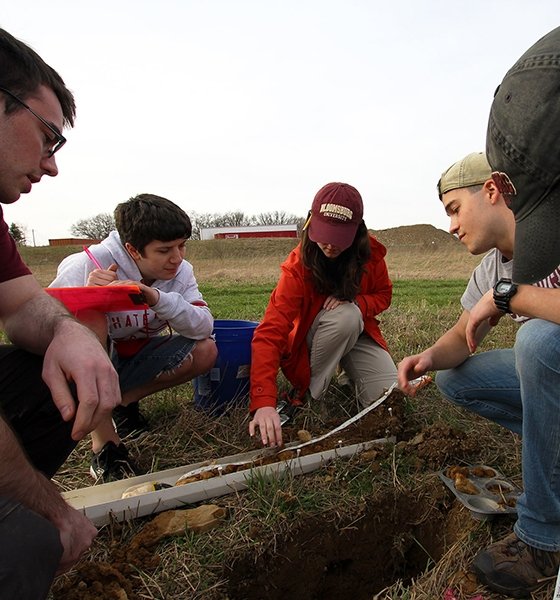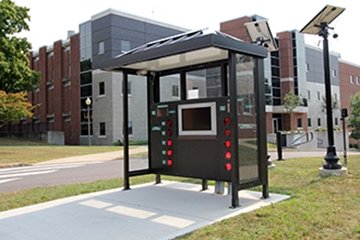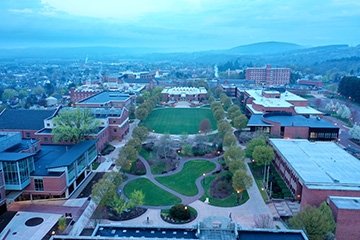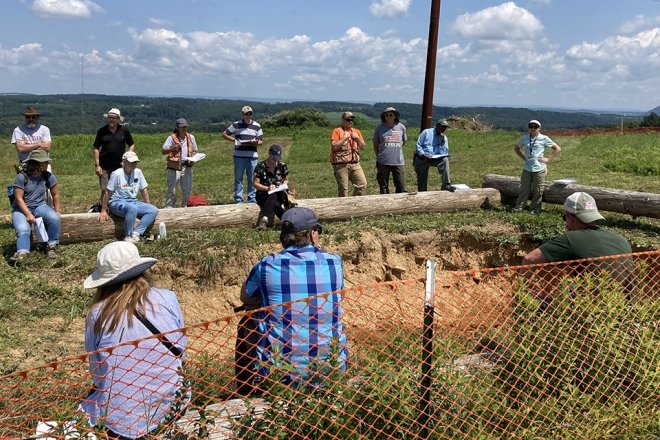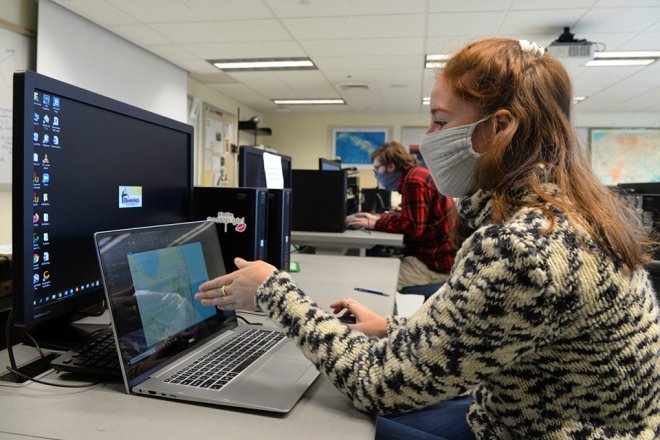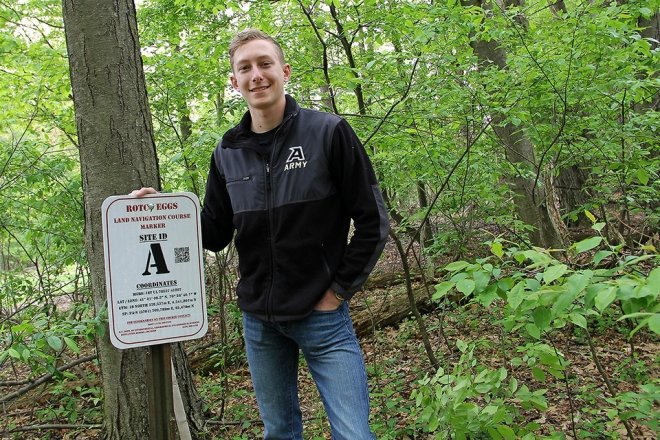Environmental, Geographical, and Geological Sciences
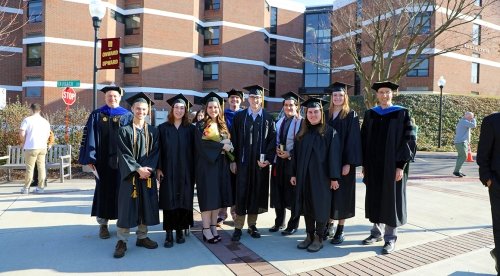
- Contact Information
-
- 570-389-4108
- Send an Email
-
127 Hartline Science Center
- Social Media
- Office Hours
-
Fall/Spring: 8 AM - 4:30 PM
Summer: 8 AM -4:00 PM
We face a changing planet, and we need people who can make a difference. We can help you become one of those people!
Why you're needed ...
Change is occurring:
- Population growth to 9+ billion people by 2100
- Greater demand for fresh water
- Climate change induced floods and drought
- Increased demand for natural resources
- A necessity for innovation and conservation
We need people ready to engage in making a difference.
- Do you like to work outside or in the lab?
- Are you interested in new technologies?
- Do you want to help build a better society?
Look no further ...
Environmental Technology (A.A.S.) or green technology (greentech), also known as clean technology (cleantech), is the application of one or more of environmental science, green chemistry, environmental monitoring, and electronic devices to monitor, model and conserve the natural environment and resources, and to curb the negative impacts of human involvement. This program is designed to be completed in two years and result in an Associate of Applied Science degree, an excellent entry-level credential. If desired, a student can continue on to complete one of the four-year major tracks listed below.
Environmental Technology is available on all Commonwealth U campuses.
Environmental Geoscience is a blend of geography and geology that prepares you for graduate school or careers focusing on water and the environment, such as water resources management, environmental consulting, watershed management, coastal or marine systems, and wetlands delineation and restoration.
Environmental Geoscience is available on all Commonwealth U campuses.
Geography and Environmental Planning prepares you for careers and for graduate school in a variety of specialties. This track is appropriate for students interested in cartography, urban, regional, or environmental planning, geographic information systems (GIS), resource management and valuation, parks and recreation.
Geography and Environmental Planning is available only on the Bloomsburg campus.
GIS and Spatial Analysis introduces you to the process and study of collecting, measuring, and interpreting geographic information in order to create and update maps and charts for regional planning, education, and other purposes.
GIS and Spatial Analysis is available only on the Bloomsburg campus.
Professional Geology is a traditional geology program that prepares you for graduate school or certification as a professional geologist (P.G.), working in careers, such as hydrogeology, natural hazard mitigation, mining, or fossil fuel exploration and production.
Professional Geology is available only on the Bloomsburg campus.
Environmental Geoscience Minor is intended for students in any major interested in customizing their degree with a focus on mineral or fossil fuel resources, surface processes, environmental consulting, etc.
Environmental Geoscience Minor is available on all Commonwealth U campuses.
Geography Minor is intended for students in any major interested in customizing their degree with a specialty, such as resource management, planning, recreation, environmental valuation, or hazard management.
Geography Minor is available on all Commonwealth U campuses.
GIS and Spatial Analysis Minor is intended for students in any major interested in customizing their degree with a focus on spatial analysis.
GIS and Spatial Analysis Minor is available only on Bloomsburg and Mansfield campuses.
Hydrology Minor is intended for students in any major interested in obtaining expertise in water resources, conservation, testing, and management.
Hydrology Minor is available on all Commonwealth U campuses.
Safety Management Minor is intended for students who are interested in managing business activities and applying principles, frameworks, and processes to help prevent accidents and injuries and minimize overall risk. Safety management also includes training employees in accident prevention, accident response, emergency preparedness, and the use of protective clothing and equipment. Several of the classes in this minor can provide opportunities for external certifications, such as HAZWOPER 40 and OSHA 10.
Safety Management Minor is available on all Commonwealth U campuses and is 100% online.
Soil Science Minor is intended for students who are interested in studying and managing soils as a natural resource. Soil scientists are needed for areas such as wetland delineation, erosion/sedimentation control, engineering, and wastewater disposal. The minor provides the educational background needed to pursue certification after graduation as a Certified Professional Soil Scientist.
Soil Science Minor is available only on the Bloomsburg campus.
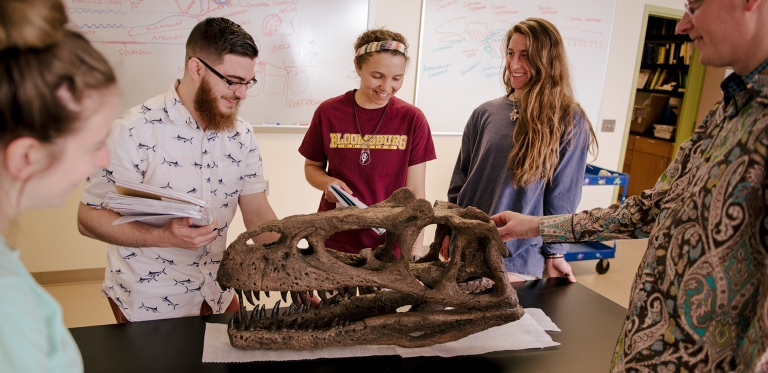
Museum Conservation is intended for students interested in preserving and maintaining collections that offer a wealth of information, especially for research scientists, as well as representing a baseline to guide conservation, restoration, and species-replacement efforts and provide material for research on evolution and species distribution.
A well-chosen minor is an excellent way to set yourself apart from others, especially when seeking a job or graduate school position. Depending on your goals, you might find it appropriate to minor in a foreign language, some area of business, writing, or one of the many COST minors available, including our own minors (really specializations) in GIS, Hydrology, Soils, or Safety Management, or others like Computer Science or Chemistry. Talk with your advisor about your ultimate career goals to help choose a perfect minor for you.
Science and Technology
Any math or science minor can be of value, depending on your interests:
Sometimes, a minor in a different field will make you stand out to an employer.
Liberal Arts
Alternatively (not minors but still useful)
- Two semesters of Arabic will be of value for anyone working in the Middle East
- Four semesters of Russian – Russia is one of the most resource rich countries.
- An Anthropology minor may be good; geoscientists are involved at most archeological sites.
Education
- The Educational Technology minor is useful for anyone interested in science education, whether in schools or industry (specialized training programs).
- Nearly every organization in education, business, and industry is engaged in the integration of technology through ongoing instruction and training in technological areas.
Business
- The Legal Studies minor is an excellent introduction for those who may pursue or need to be familiar with any type of environmental regulations or environmental law.
- A Management minor is useful for those who wish to have advancement options in scientific or engineering industries and companies.
Common Core
All four tracks begin with a common core of four courses that cover the breadth of our discipline, covering geography, environmental science, geology, and mapping technology. This ensures that all of our students have a solid foundation in and exposure to the range of topics found in our highly interdisciplinary field. From this base, students branch out and increasingly specialize into their particular field of interest. At the sophomore level, there is still enough overlap in most tracks so that students could change major tracks with little or no course penalty.
Related Science and Math Cognates
All EGGS majors must take some courses in related science disciplines such as biology, physics, and chemistry because these are vital to developing a good understanding of the Earth, and our interactions with it! For instance, to treat a stream affected by acid mine drainage, it helps to understand some chemistry; to work for an alternative energy company, it helps to understand some physics; and understanding stream biology can help students restore a stream damaged by dredging or bank erosion.
At least one math course is also required. Having good math skills helps our majors identify and analyze patterns, construct logical arguments, and dissect and solve problems.
Science and Math Cognate Courses: The number and type of required cognate science and math courses vary, depending on your chosen EGGS track.
Specific Degree Requirements
Each track has additional required foundational courses, as well as upper-level electives that allow you to specialize in a particular area of interest.
General Education Courses
In addition to courses required for the major, every student at Bloomsburg University must also complete the General Education requirements. General Education courses will connect you to the world of ideas outside of EGGS, and help you develop the critical thinking and communication skills that are vital for success in every job. Thoughtful planning will allow you to choose approved General Education courses that reflect your interests, strengthen your major, and perhaps even get you started on a related minor.
For example:
- if you're interested in working for an environmental advocacy organization, you could take Public Speaking.
- If you plan to work in public policy, or get a job with a municipality, the Commonwealth, or the Federal Government, you might want to take Elements of Political Science, or U.S. Government.
- Introduction to Business might be appropriate for students interested in environmental consulting, where career paths often start in the field, but lead into the office where you might oversee projects and/or to help manage the business.
Tentative Schedule of EGGS courses
While most of our general education and introductory courses are offered every semester, many of our upper-level courses are not! Some are offered once a year, others once every other year or every three semesters. Knowing when the classes needed for your major are offered will help you determine when to take prerequisites for necessary coursework, and when specific requirements and electives will best fit into your plan.
EGGS Course Prerequisites
Sometimes we require that you take courses in a specific order. Mastering fundamental concepts in one course allows you to succeed in another course that builds upon those fundamentals. When we need you to take classes in a particular order, we make one course a required prerequisite for the next. You will not be able to register for the higher-number course until you have completed (or are taking) the prerequisite lower-number course. For instance, you must take EGGS 242 - Map Use and Analysis before you take EGGS 360 - Principles of GIS I. Being aware of course prerequisites will help you map out an efficient plan for completing the major (as will seeing your advisor regularly!).
Geographic Information Systems (GIS) and Spatial Analysis
Digital Mapping Sciences (aka Geographical Information Systems, or GIS) are a rapidly growing field. They are used in a vast array of commercial domains including business sales and service, national intelligence, government planning, emergency management, and virtually every scientific field that maps spatial data including environmental science, archaeology, conservation biology, and geology.
The courses listed below are available for the STEM magnet track. The sequence provides students with a solid foundation in GIS mapping and programming that can be applied to a wide array of careers.
Junior Year
- Fall: EGGS 242 Map Use and Analysis, and Elective 1
- Spring: EGGS 360 Principles of GIS I, and Elective 2
Senior Year
- Fall: EGGS 361 Principles of GIS II, and Elective 3
- Spring: Electives 4 and 5, or a High School GIS Internship
Major in GIS?
The STEM track provides a standalone skillset that high school students can use to enhance their studies in many different academic domains (e.g., biology, business, sociology, etc.). For students with an interest in pursuing a geotechnical career, the Bloomsburg University EGGS Department offers major and minor degrees in GIS and Spatial Analysis.
Course List
- EGGS 160 - Digital Earth
- EGGS 242 - Map Use and Analysis
- EGGS 320 - Remote Sensing
- EGGS 360 - Principles of GIS 1
- EGGS 361 - Principles of GIS 2
- EGGS 364 - Digital Cartography
- EGGS 390 - UAV / Drones
- COMPSCI 115 - Python
- COMPSCI 215 - Advanced Python
- ENGTECH 180 - CAD
For more information contact Dr. Michael Shepard, Chair, at mshepard@bloomu.edu | (570) 389-4568 or Dr. Jeff Brunskill, GIS Program Coordinator, at jbrunski@bloomu.edu | (570) 389-4355

